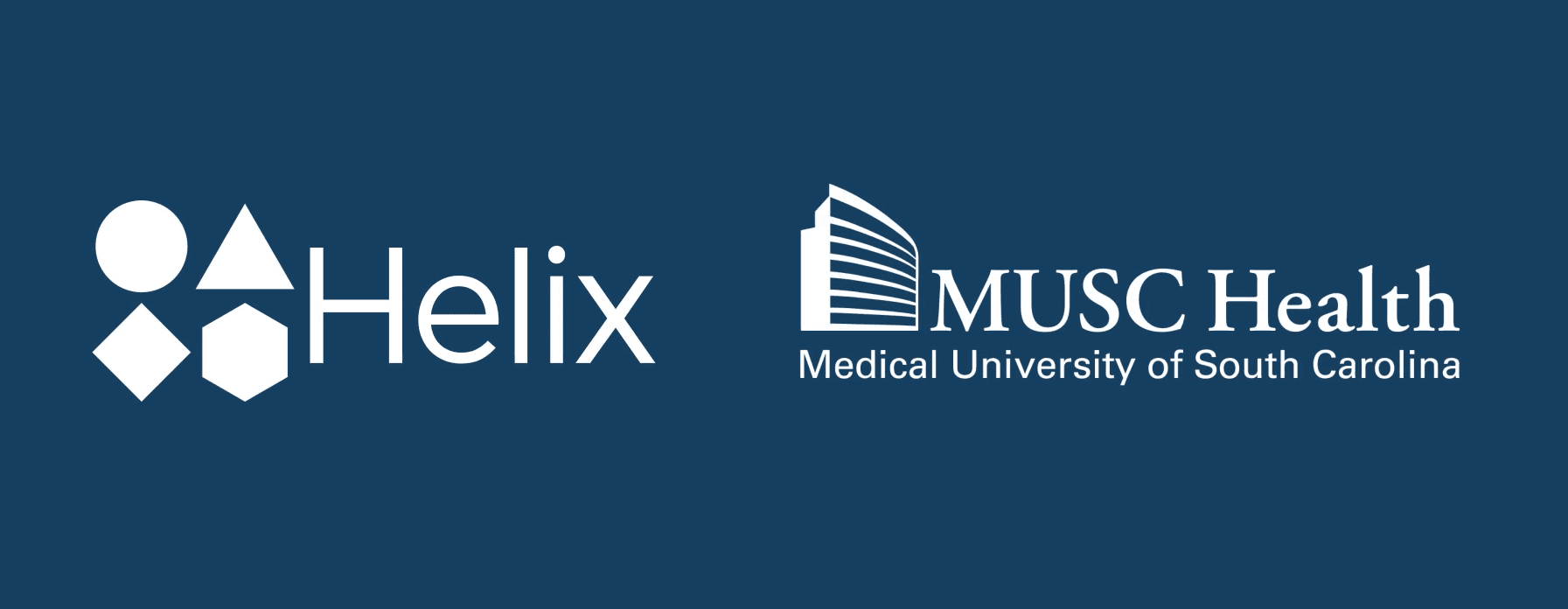Advancing Precision Medicine in South Carolina

In September this year, the Medical University of South Carolina (MUSC) officially announced their entry into the fast-expanding space of population genomics with the launch of the In Our DNA SC program. In partnership with Helix, MUSC aims to recruit 100,000 participants from diverse communities across the state over the next four years. Similarly to other population genomics projects—such as Mayo
Clinic’s Tapestry or Renown Health’s Healthy Nevada Project, which target 100,000 and 250,000 participants, respectively—In Our DNA SC aims to increase the access to and impact of precision medicine. The initiative is unique in its focus on recruiting participants from historically marginalized groups to ensure that its data reflects all communities in South Carolina.
Watch the short three-minute video to hear leaders from MUSC and Helix share their expectations for the initiative and how the partnership will benefit South Carolinians:
Population genomics projects proactively screen large groups of people for actionable genetic conditions. In doing so, health systems are able to expand their clinical impact while also collecting insights to drive novel research and discovery.
Like similar population genomics programs, such as Mayo Clinic’s Tapestry study, MUSC will screen participants for genetic variants known to cause Hereditary Breast and Ovarian Cancer (HBOC), Familial hypercholesterolemia (FH), and Lynch syndrome (LS)—three conditions the CDC has classified as “Tier 1”. Variants related to these conditions significantly increase a patient’s likelihood of disease development, yet as many as 90% of carriers are missed under current medical practice1. By screening for CDC Tier 1 conditions, In Our DNA SC will help drive early identification of variant carriers, which previous research suggests may be as many as 1:75 participants. Early detection enables proactive steps, like increased screening and preventative procedures, to be taken to improve health outcomes for these participants.
Additionally, by leveraging Helix’s Exome+® assay and electronic health record integrations, a portable, digital genomic resource is created for each consenting individual. This means that across MUSC, healthcare providers will be able to order additional genomic tests, such as cancer panels and pharmacogenomics, and receive results on-demand at the point of care without the need to collect another sample, a capability referred to as the Sequence Once, Query OftenTM model.
In this way, projects like In Our DNA SC can have a dramatic impact on the quality of care patients receive. Daniel Judge, M.D., director of the MUSC Cardiovascular Genetics program and the fellowship director for Cardiovascular Disease at MUSC, recently emphasized the benefits of collecting clinical grade sequencing data for each participant: “What we’re excited about with Helix is that they’re a CLIA-certified lab, so anything that’s done at a research-level if it’s got a clinical validation and a clinical use, we can issue a clinical report and have immediate benefits for our patients and participants.”
Currently, population genomics projects throughout the United States aim to enroll more than 4 million participants, approximately half of which will be through health systems. The prominence of health systems in driving population genomics efforts isn’t surprising either — their strong relationships with patients, ability to drive follow-up on clinical action plans, and ability to combine the genomic data with rich clinical data (EHRs) enable them to rapidly integrate genomics into clinical care while also generating vast amounts of clinico-genomic data. As a result, health systems engaged in population genomics projects are likely to be leaders in developing novel genetic discoveries.
In Our DNA SC will also use data from consenting participants to build a comprehensive clinico-genomic dataset to advance our understanding of how genetics influences health, disease, and healthcare outcomes. Between the immediate benefits of identifying at-risk individuals and the long-term benefits of accelerating clinico-genomic discovery, In Our DNA SC will play an exciting role in driving precision medicine forward in South Carolina and across the US.
- References
Grzymski, J. J., et al. “Population Genetic Screening Efficiently Identifies Carriers of Autosomal Dominant Diseases.” Nature Medicine, vol. 26, no. 8, 27 July 2020, pp. 1235–1239, 10.1038/s41591-020-0982-5. Accessed 29 Apr. 2021. - Bonnefond, Amélie, et al. “Pathogenic Variants in Actionable MODY Genes Are Associated with Type 2 Diabetes.” Nature Metabolism, vol. 2, no. 10, Oct. 2020, pp. 1126–1134, 10.1038/s42255-020-00294-3. Accessed 11 Nov. 2021.
- Luo, Shishi, et al. “Comprehensive Allele Genotyping in Critical Pharmacogenes Reduces Residual Clinical Risk in Diverse Populations.” Clinical Pharmacology & Therapeutics, vol. 110, no. 3, 7 June 2021, pp. 759–767, 10.1002/cpt.2279. Accessed 11 Nov. 2021.
- Schiabor Barrett, Kelly M., et al. “Positive Predictive Value Highlights Four Novel Candidates for Actionable Genetic Screening from Analysis of 220,000 Clinicogenomic Records.” Genetics in Medicine, 13 Aug. 2021, 10.1038/s41436-021-01293-9. Accessed 11 Nov. 2021.